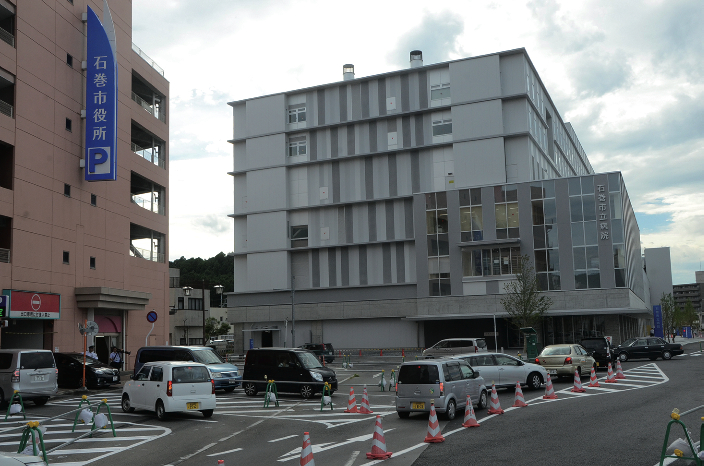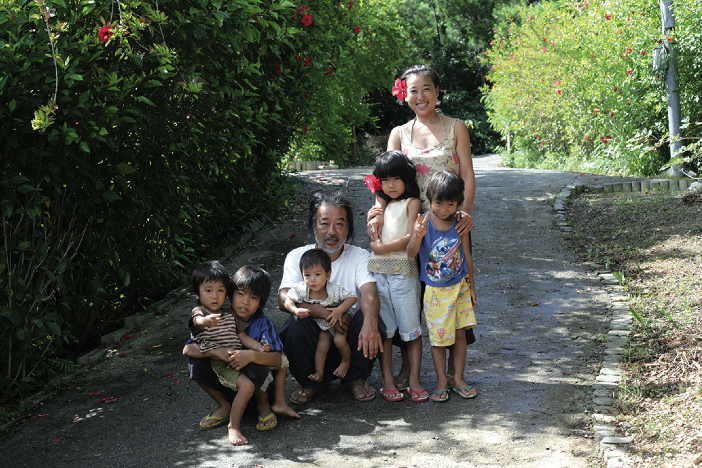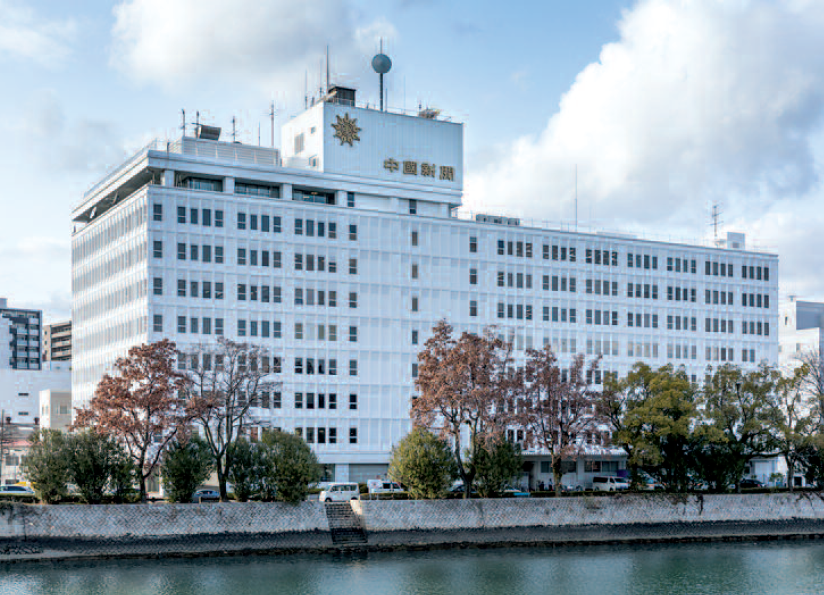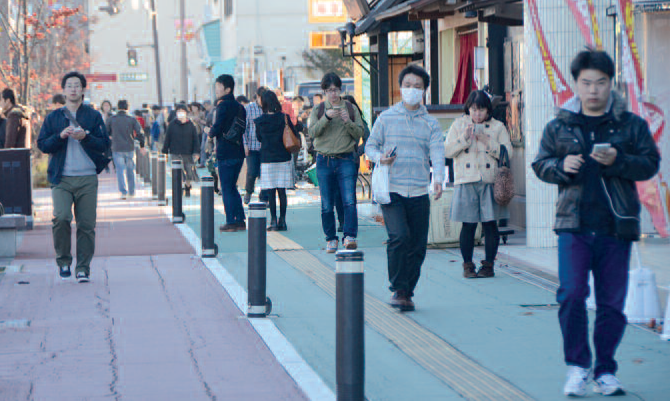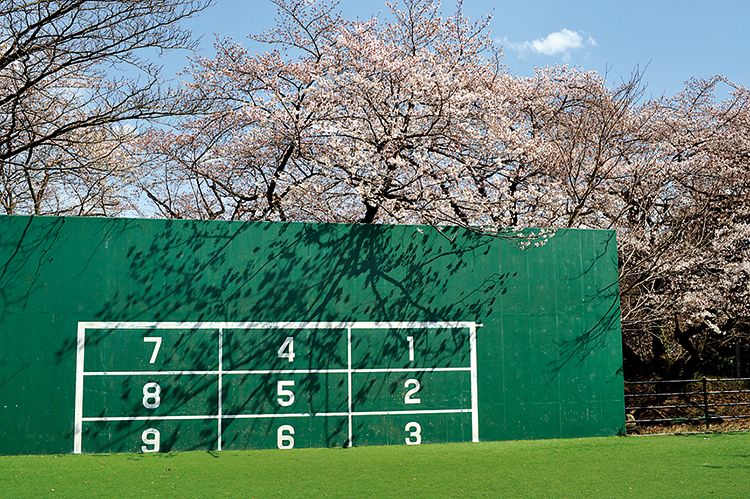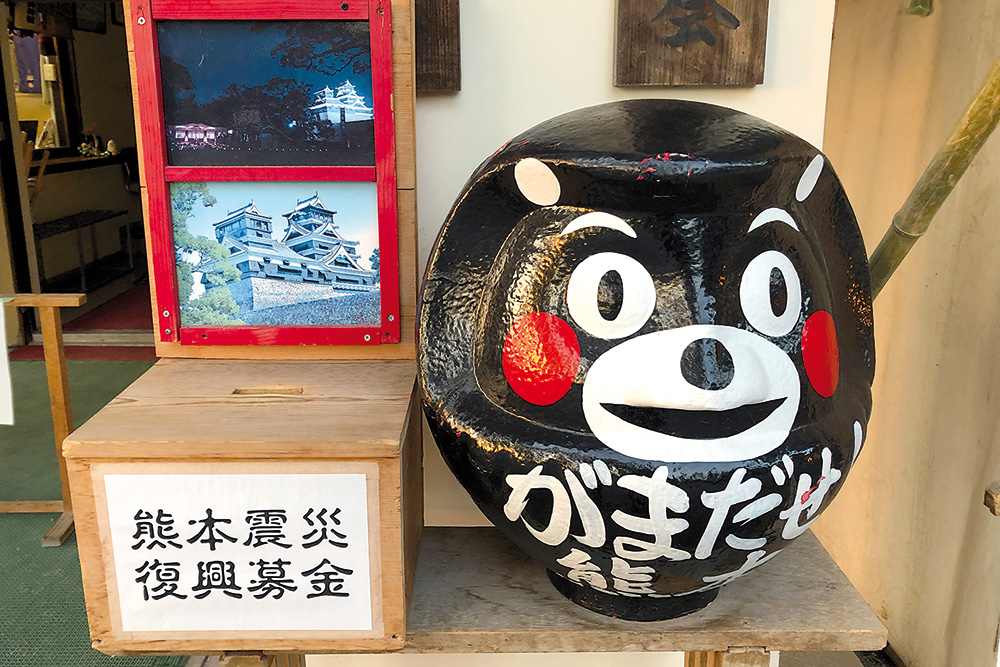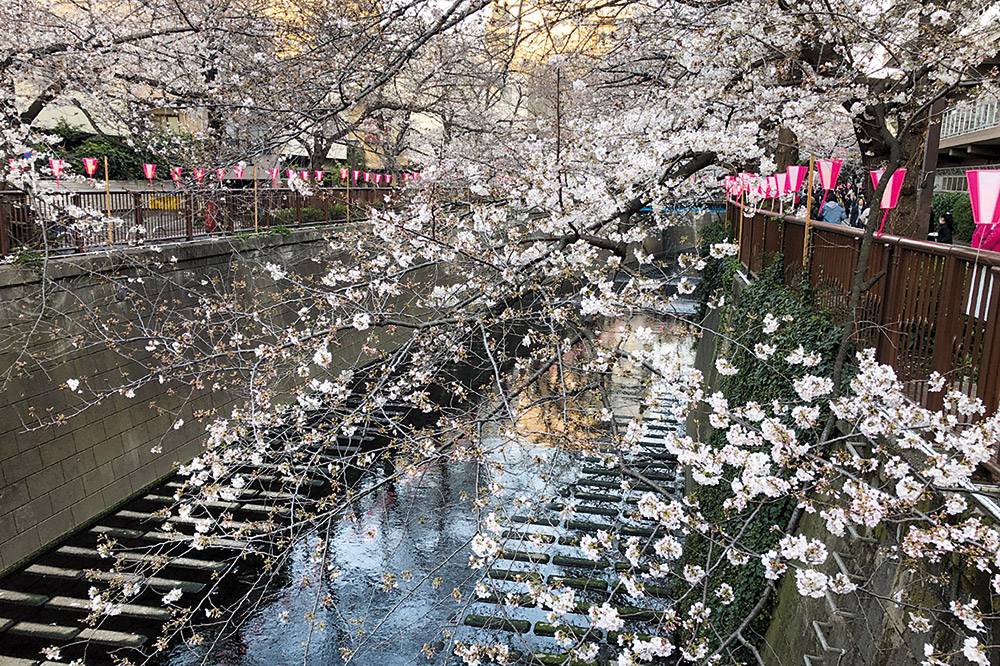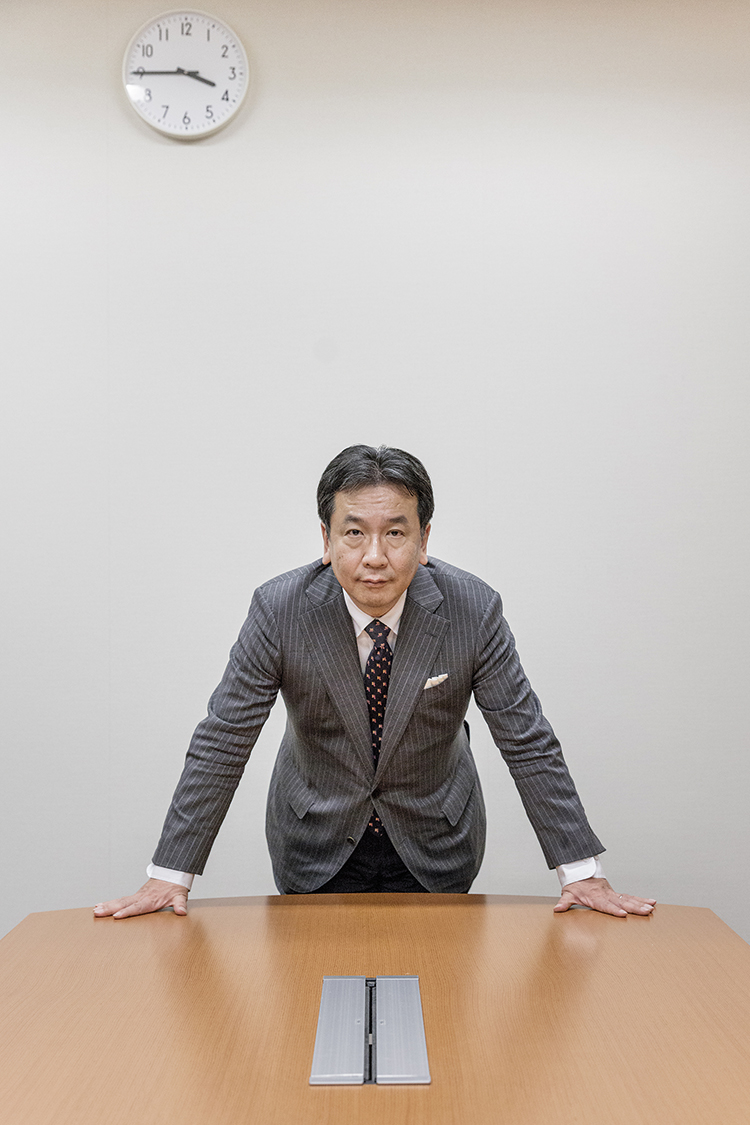
As leader of the main opposition party, the former minister dreams of changing the rules governing the country.

Edano Yukio (53), is president of the centre-left Rikken Minshuto CDP (Constitutional Democratic Party). The party won more than 50 seats in the general election in October 2017, and has established itself as the main opposition force. The politician met Zoom Japan to explain his political agenda in support of “grass roots politics” in detail.
In last autumn’s general election, you succeeded in gaining 55 seats though your party had only just come into being following the split of the Progressive Democratic Party. The press spoke of a “stunt”. What’s your opinion?
Edano Yukio: To be honest, I wasn’t expecting to gain so many seats. But we achieved this result due to the fact that the politics of the parties are clear to the voters. The Democratic Party [the centre-left party that held power from 2009 to 2012, in which Edano was a member] had always been criticized for its internal ideological conflicts. It wasn’t clear to the electorate how it wanted to govern the country. But after the autumn elections, the differences with the Liberal Democratic Party [LDP, in power] are quite obvious now.
During the election campaign, you supported the idea of “grass-roots politics”. What does this mean?
Edano Yukio: There are two meanings. Since its defeat in 1945, Japan has embraced an economic policy that favours the rich and powerful as they were supposed to make the country wealthy. I consider it to be a strategy adapted to developing countries. Prime Minister Abe Shinzo’s policies are identical. Now, it’s obvious that Japanese society is at a more advanced stage, with an ageing population and a very low birth-rate. In these conditions, it’s necessary to try another approach, one which will correct economic inequality by increasing the redistribution of wealth. This approach, better adapted to the reality of the country’s situation, will encourage increased household spending and promote growth. The second meaning of the slogan is more political. I believe that the issues that preoccupy the members of parliament in Tokyo are of no concern to the majority of Japanese people. For example, the Prime Minister is proposing to make nursery childcare free, whereas one of the best ways to raise the birthrate would be to make up for the basic lack of nurseries by building more of them! This proposal speaks volumes about Abe Shinzo’s vision, which, it seems to me, completely ignores what’s happening on the ground. I insisted on this slogan as I believe it’s time for the political elite in Nagatacho [the district where Parliament is located] to come out from behind their closed doors and face reality.
That hasn’t prevented the LDP from being successful in national elections since 2012…
E.Y.: The Democratic Party gained power in 2009, but it was incapable of responding to the expectations of the electors. Without doubt, the run of LDP victories is a consequence of this. Moreover, since 2012, the opposition parties haven’t managed to agree on a clear political agenda. Since the October elections, that’s no longer the case. We’ve even succeeded in gaining more votes than any other opposition party since 2012, despite the very short preparation time we had at our disposal [the CDP was only able to put forward 78 candidates, of whom 55 were elected].
In your manifesto, you said “diversity” was a central tenet of your policies. What do you mean exactly?
E.Y.: For me, it’s about passing on the message that it’s becoming ever more important to learn how to live side by side with people who have different philosophical outlooks and convictions. We must know how to recognise and appreciate difference. If we become divided because other groups of people hold different opinions, society will fall apart.
Japan still hasn’t made same-sex marriage legal. What’s your opinion on the matter?
E.Y.: We have yet to explain our policy about this in detail, but we are in favour of making it legal. We want to create a tolerant country. LGBT people should be part of this society just like everyone else. And that’s the same for the disabled and those of foreign origin.
Still on the subject of diversity, it has to be acknowledged that Japan is very backward in the matter of equality between men and women. In the latest league tables from the World Economic Forum, the country is placed 114th out of 144…
E.Y.: Since the creation of the CDP, we have set up a special committee to deal with this situation. I suggest two ways to solve this problem. Firstly, we must improve the status of working women. We must ensure that men and women can both go out to work and raise children. To achieve this, we need to tackle business infrastructure as a priority.
The second approach is cultural. Women should be able to keep their own surnames after marriage [In Japan, the vast majority of women choose to use their husband’s surname]. It is a symbolic gesture, but very important to help promote equality between men and women.
However, on the executive committee of the CDP there are only 5 women out of 22 members…
E.Y.: In Japan, very few women seek election. That’s the reality. I believe that more women are in positions of responsibility in our party than in Parliament as a whole, where they are in the minority [around 10%]. The party is very new, but we’re trying to find women who want to put themselves forward for election, while still working on the question of equality between men and women. Have you decided on numbers? E.Y.: The ideal would be even numbers. But, for now, we must emphasize that our party is very young, and we’re still working on our policies, so it’s still too soon to decide exactly how many.
Another problem in Japan is the declining population. In 2016, it shrank by 300,000. What remedies do you propose?
E.Y.: To reverse this trend, the only solution is to put in place a system to encourage young couples to have children. We must build more nurseries and increase the teachers’ salaries. Then, we must make sure that it’s easier for women with children to go out to work. I don’t see that there’s any other way.
Many people see immigration as a way to stop demographic decline. What are you thoughts about this?
E.Y.: The question is knowing whether Japanese society is ready to accept immigrants in a civilized manner. I don’t think it is. In fact, I fear that if we opened the door to large numbers of unqualified foreigners, it would provoke a xenophobic backlash. There are nationalists who are already spreading hate-speech about foreigners… Japanese society is not yet prepared to accept large scale immigration.
What’s your opinion on the economy?
E.Y.: Exports have hardly fallen since the time of the economic bubble. It’s household spending that’s plummeted, and that’s what explains the economic stagnation. The explanation for this decrease can be found in increased social inequality and worsening working conditions. It’s something that’s quite obvious, which statistics clearly illustrate, but nobody is talking about it. So the only thing to do is encourage consumption, and to do that, it’s important to tackle inequality.
However, cumulative profits of Japanese companies were at record levels in 2016…
E.Y.: Actually, the present tax system is too biased towards benefiting big business. Some say it’s important to give them tax breaks as they are having to face up to increasingly tough international competition. But that’s a complete lie! Corporation tax is levied only on companies’ profits, and it has nothing to do with the costs they have to bear due to competition. It’s the same for their investments, which are simply not taxed at all! I see no point in following the global trend and lowering corporation tax; the companies that are leaving to go abroad in search of a more favourable tax environment would leave whatever the tax rate.
On the political front, the government appears ready to introduce constitutional reform. What’s your position on the matter?
E.Y.: I’m not opposed to it as such. But what the Prime Minister intends to do is a continuation of his policies in favour of collective selfdefence. If the rights of the Self-Defence Forces are officially recognized in the Constitution, it could lead to numerous different interpretations of the text, which has been a temptation previously. In addition, the political debate about the constitutional position of the Self-Defence Forces closed down a long time ago, and has not been questioned for a long time! So we’ve no interest in amending the Constitution in this way, and we’re prepared to fight this to the very end.
What do you think about the right to collective self-defence?
E.Y.: I’m opposed to it because defence policy should be crystal clear. Limits to individual selfdefence, where you don’t react militarily except in the case of a direct attack on Japanese territory by a foreign forces, are much clearer than the principle of collective self-defence. The Prime Minister’s proposals are open to vague interpretation, and there’s no knowing how he would be tempted to apply them. Collective selfdefence is neither logical nor does it make any sense in the context of our history.
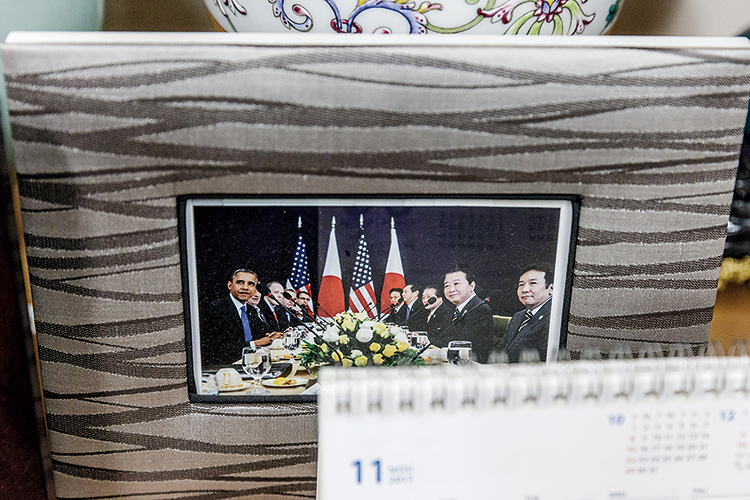
A souvenir of a meeting with Barack Obama at a Japanese-American summit. Edano Yukio hopes for a more balanced relationship with Washington.
In your manifesto you state you’re in favour of a “fairer” Japanese-American alliance. Could you expand on this?
E.Y.: The alliance with the United States is of the greatest importance to Japan. However, the attitude of the Japanese government towards Washington has always been servile, and it has got worse while Abe has been in power. It’s as though we’re completely dependent on the United States for our security. Certainly, Japan enjoys American protection, but, at the same time, we must not forget that, in return, we allow American military bases in our country. So it doesn’t make sense to behave in a servile manner, and our relationship with Washington should be as equals.
In 2011, you were the minister in charge of Okinawa. What do you think about the relocation of the American base in Henoko (see Zoom Japan no.48, February 2017).
E.Y.: The Abe government’s measures are only increasing local opposition. They’re not taking regional sovereignty into account and could even risk relations with the United States. The project should be reviewed. As it’s also a matter of diplomacy between Tokyo and Washington, we must work with the Americans to sort it out. We do not want to repeat the errors of former prime minister Hatoyama Yukio [Democratic Party leader in power from 2009 to 2010], who promised to remove the base from the prefecture without questioning whether it was feasible. Besides, the present American government is adamant on the subject. We must try to find an alternative while maintaining a dialogue with the Americans and the local authorities.
It’s been 7 years since the Fukushima nuclear disaster. One of the pillars of your policies is to phase out nuclear energy. How do you hope to achieve this?
E.Y.: To shut down nuclear power production we need to do three things. Firstly, we must find a way to solve the problem of storing the nuclear waste that was supposed to be treated at the Rokkasho reprocessing plant in the north of the archipelago.
Secondly, electricity suppliers will probably collapse with the burden of the costs entailed from the closure of nuclear power plants. We must find a way of avoiding this situation.
Lastly, we must consider those regions where nuclear power plants represent an important part their income. We must find a solution in order that they can escape their economic dependence on nuclear power. So it’s important to start putting these measures in place, so that these problems can be sorted out without any delay as soon as we are in power.
The next national elections – for the senate – will be in summer 2019. The key to success depends on the opposition parties working together. What’s your opinion about this?
E.Y.: For single member constituencies, of which there are many in the senate elections [31 constituencies out of 47], the opposition parties must effectively put forward only one candidate to check the LDP. Otherwise we’ll never win. We must remember that, in 2016, the call to the opposition parties from the Citizens’ Union [a group of academics and left-wing militants fighting to abolish the government’s defence law] in favour of a single candidate for single member constituencies bore fruit. Thanks to it, we were able to avoid pointless political bickering. We want to do the same thing for the 2019 senate ballot, so as to mobilize those citizens who oppose the policies of the present Prime Minister.
INTERVIEW BY YAGISHITA YUTA

